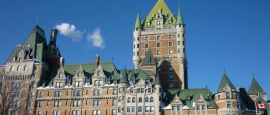Quebec City History
Quebec City’s ramparts, bastions and cobblestone streets are a testament to the city’s dramatic history.
Aboriginal hunters had lived in the area for thousands of years before Europeans set foot here.
When explorer Jacques Cartier sailed up the St Lawrence River in 1535, he encountered Stadacona, home to 1,000 or so Huron Indians. This would later become the site of Quebec City.
It wasn’t until 1608 that Samuel de Champlain established the first permanent settlement here – a flourishing fur-trading post. By this time, the Stadaconans had disappeared.
The Brits fancied a slice of the lucrative fur-trading pie however and repeatedly tried to capture the town, which had become the capital of New France.
The future of North America turned on one historic battle that took place just outside Quebec's walls in 1759. British forces overcame a French defence on the Plains of Abraham, which eventually led to the fall of New France and the transfer of most of its land to British control.
A second Battle of Quebec during the American Revolution in 1775 saw the British successfully battling off American forces.
To prevent a similar future attack, the British constructed the Citadel, an enormous star-shaped fortress and one of Quebec City's most popular attractions.
When Canada became an independent country in 1867, Quebec City became the capital of the province of Quebec. By this time, Montreal had taken over as the province’s commercial hub.
Today, the provincial government is a major employer. The port remains important too, handling bulk goods, but also welcoming thousands of tourists each year to its cruise ship terminal.
Did you know?
• Quebec City is the only fortified city north of Mexico.
• JA Moisan opened in 1871 and claims to be the oldest grocery store in North America.
• You can experience a taste of 17th- and 18th-century life in Quebec City at the New France Festival, held here each August.
Do you have any Feedback about this page?
© 2026 Columbus Travel Media Ltd. All rights reserved. No part of this site may be reproduced without our written permission, click here for information on Columbus Content Solutions.




 You know where
You know where